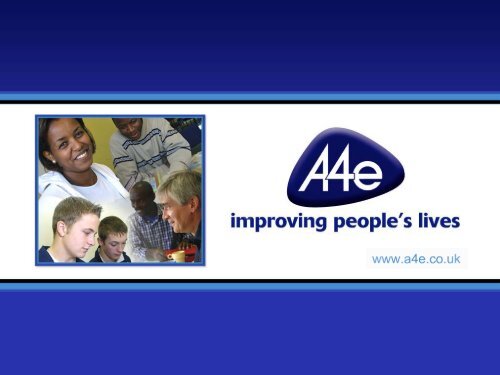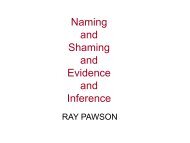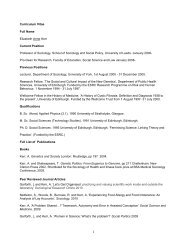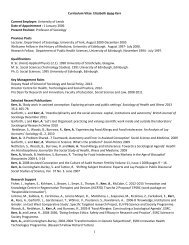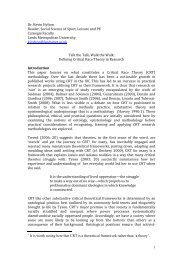Mark Lovell (Executive Chairman, A4e) - Sociology and Social Policy
Mark Lovell (Executive Chairman, A4e) - Sociology and Social Policy
Mark Lovell (Executive Chairman, A4e) - Sociology and Social Policy
- No tags were found...
You also want an ePaper? Increase the reach of your titles
YUMPU automatically turns print PDFs into web optimized ePapers that Google loves.
Jon TriggStrategy DirectorDem<strong>and</strong> Led Welfare Services:An International Perspective
Who are <strong>A4e</strong>Mission– Improving People’s LivesBusiness– Running front line public services<strong>Mark</strong>et– International public service reformSectors– Customer facing public services
Background on <strong>A4e</strong>• 3,000 staff delivering front line public services• Focus on managing supply <strong>and</strong> dem<strong>and</strong> in markets in which we work• Over 200 locations in UK <strong>and</strong> overseas• Collaborative model working with third sector, faith groups, business<strong>and</strong> public sectorsDriving international social inclusion by joining up social <strong>and</strong> economicdevelopment to;• eradicate poverty• tackle inequality• upskill nations• drive employment
<strong>A4e</strong> – learning from global marketsSince 2004 <strong>A4e</strong> hasexp<strong>and</strong>ed its operations:• Israel• France• Germany• Pol<strong>and</strong>• India• South Africa• Slovakia• Australia
Global Challenges – Key Statistics• The number of people unemployed worldwide remains at an historical high• Consistently high unemployment rates <strong>and</strong> scant progress in reducing workingpoverty• In Europe, unemployment remains above 7.5 % in some countries: e.g.Germany (9.8%), France (9.2%), Pol<strong>and</strong> (13.8%), Euro Area (8.2%)• Youth unemployment rates are on average more than double that of adults• In addition, the long-term unemployed <strong>and</strong> those with lower skill levels find itharder to get work.Source: ILO, Global Employment Trends 2007 & OECD St<strong>and</strong>ardised Unemployment Rates Nov 2007
Global Response…• What were once seen as ‘national problems’ are nowviewed as global trends – requiring global solutions• There is a search for international models of best practicethat can be adopted <strong>and</strong> applied• In a tightening global economy, governments are looking todeliver higher quality services <strong>and</strong> higher performanceoutcomes at lower costs to the taxpayer
So where ever you are…• Increased social spending is unsustainable• Financial <strong>and</strong> economic slow turn• Widening gap with hard to reach groups• Skills gap• Health barriers• High levels of offenders• Migrant labourIn order to tackle these complex issues the customer must beput at the centre of policy design <strong>and</strong> service deliveryDem<strong>and</strong> led models are required
Dem<strong>and</strong> led brings many challengesEnhanced Partnership(capacity building)Private SectorBusinessDelivery <strong>and</strong>employmentdestinationCommunity BasedOrganisationsPublic SectorFund <strong>and</strong> SupplyAccessingthe hard toreachEffective DeliverySuppliers SectorPrivate & ThirdFaith SectorOrganisations
Dem<strong>and</strong> led – raises issues for governmentsSimilar themes in every country in tackling social exclusion/welfare:• A need to focus on outcomes• Hard for governments to move away from funding inputs• Need to invest over a longer term• Requirement to fund <strong>and</strong> resource preventative measures• New models needed to look at ‘cost of not doing something’• More risk <strong>and</strong> reward sharing to effectively fund service offer• Pressure to (<strong>and</strong> lots of opportunity) to eradicate duplication <strong>and</strong> drivevalue for money/savings to drive more funds to front lineDem<strong>and</strong> led is also about meeting government needs
Dem<strong>and</strong> led – market requirementsEmployer requirements• Helping business identify <strong>and</strong> meet skills gaps - strategy• Re-engineering terms <strong>and</strong> conditions of employment - equality• In work support programmes for employee <strong>and</strong> businessThird Sector requirements• Essential part of supply chain• Differentiated funding <strong>and</strong> service models• Advocacy <strong>and</strong> challenge to the service offer – client safety netsDem<strong>and</strong> led means balancing dem<strong>and</strong>s across the system/market
Dem<strong>and</strong> led – putting consumer firstSimilar themes in every country in tackling social exclusion/welfare:• Poverty – number one challenge, including working families• Services to prevent re-offending• Legal services <strong>and</strong> advocacy• Housing <strong>and</strong> shelter• Health, including mental health• Access to convenient, affordable childcare <strong>and</strong> flexible working• Skills <strong>and</strong> training – to enter <strong>and</strong> progress in the labour market• Transport <strong>and</strong> access to technologyDem<strong>and</strong> led means breaking down barriers together
Modern Welfare States….<strong>Social</strong> exclusion <strong>and</strong> welfare is a global issue• Employability rates not just ‘unemployment’– Broader client group– One size doesn’t fit all – expert knowledge– Importance of effective partnership• Total impact of <strong>Social</strong> Exclusion <strong>and</strong> Worklessness– Whole life cost– Cost efficient solutions• Sustaining jobs <strong>and</strong> progression– Join up with skills, poverty, health, IAG…– Work first but not any work first – career first
International Delivery – Some examplesLearning <strong>and</strong> designing dem<strong>and</strong> led policy :• Germany - Family Programme, 50+ model• Israel – Operating under a benefits saving model• India – Joining up Employability & Skills servicesto match employer/individual dem<strong>and</strong>• UK fND – an opportunity not to be missed
Germany: Family Programme in Gelsenkirchen• Facilitate change for the entire family to a work firstlifestyle – challenge <strong>and</strong> support• Addresses generational impact of unemploymentTraditional ModelFamily PilotKeyJob Scout Client
What are the benefits?• Benefit to Government:– More effective use of monies spent onLabour <strong>Mark</strong>et interventions;– Greater reduction in welfare benefitpayments;– Model of best practise for benefitreduction in Germany.• Benefit to Families:– Developing stronger family units;– Financial independence <strong>and</strong>increased st<strong>and</strong>ard of living;– Role models for the future.
Israel – Welfare to Work• Started out as a benefits savings programme– % share of benefits savings – after 2 years off benefit• Now more focused as a job creation model– Output payments based on % of salaries of ourcustomers for 6 monthsInput constraints but new model to meet business <strong>and</strong>individual needs as they develop
India: Meeting the Employment/Skills ChallengeISSUES• A school drop out rate of 90%,with no active, large scale, skillsdevelopment programmes• Current structured vocationaltraining/general educationreaches only 30 million (3% ofpopulation)• 2.5 million graduates pass out ofcolleges every year without skillsconnected to employment• For those in work, 70% aredefined as illiterate or educatedbelow primary level<strong>A4e</strong> SOLUTIONS• Face to face employabilityprogrammes alongside academicstudies – to stimulate dem<strong>and</strong> ineducational systems• Work with governmentdepartments <strong>and</strong> employerfederations to develop skillsprovider base throughpartnerships to meet dem<strong>and</strong> foremployability• Test delivery models on theground to provide skills to youngpeople across Rajasthan
Dem<strong>and</strong> led fND….• Encouraging signs to date• ITT not full of input measures• Freedom to design service to meet customerneeds• Opportunity to innovate <strong>and</strong> join up services• Ability to meet business <strong>and</strong> individual needs• Lots of wrinkles to iron out too• Maybe discuss this time next year…
Summary• Across the world the issues are very different <strong>and</strong> exactly the same• We need to listen to our customers to design effective responses• Putting the customer at the heart of design offers the only way to address theneeds of the hardest to help harnessing the strengths <strong>and</strong> benefits of the public,private <strong>and</strong> third sectors• <strong>A4e</strong> is committed to Improving People’s Lives through successful partnerships• <strong>A4e</strong> offers experience <strong>and</strong> expertise of testing models of dem<strong>and</strong> led services inUK <strong>and</strong> international markets – none are ideal, all provide progress• By sharing our experiences <strong>and</strong> strategies for social inclusion <strong>and</strong> change withstakeholders, we hope we will inspire <strong>and</strong> provoke creative debate
Thank youQuestions?


